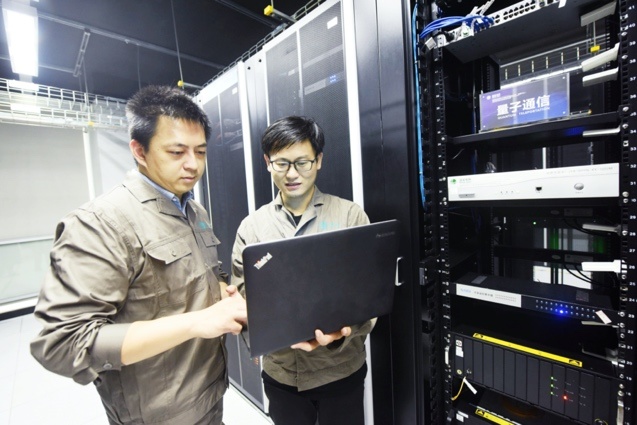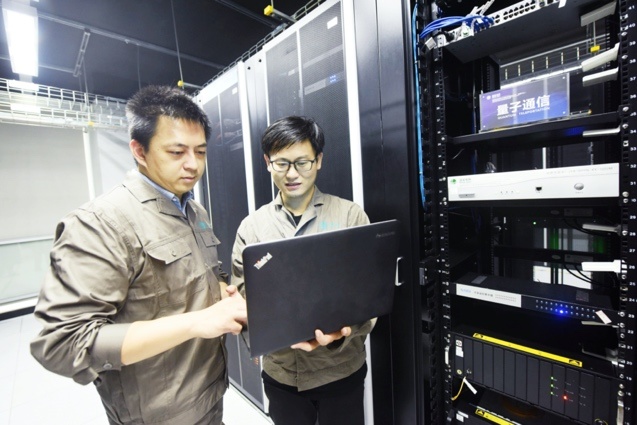By You Yi, People’s Daily

Workers with the information and communication branch of State Grid Hangzhou Power Supply Company check quantum communication equipment in a machine room, Nov. 2. (Photo by Long Wei/People’s Daily Online)
A research team led by professors Pan Jianwei and Lu Chaoyang of the University of Science and Technology of China has recently established a quantum computer prototype named “Jiuzhang”, via which up to 76 photons were detected.
The achievement was made through joint efforts of the research team and the Shanghai Institute of Microsystem and Information Technology and the National Parallel Computer Engineering Technology Research Center.
Jiuzhang can process 50 million samples within 200 seconds by Gaussian boson sampling (GBS), a classical simulation algorithm, compared with 600 million years for the current most powerful supercomputer in the world.
The breakthrough marks the first time that China has realized a quantum computational advantage, or "quantum supremacy", which makes the country the second in the world to achieve the feat.
Jiuzhang’s research team published their achievement on Science magazine, one of the world's top academic journals, on Dec. 4.
"Quantum supremacy" appears when a new quantum computer prototype outperforms the most powerful classical computers in terms of computing power in handling a particular task.
The result also proves that the new quantum computer prototype will possibly outperform traditional computers and more breakthroughs in many other areas in the future.
One of the most important issues in the cutting edge of quantum science is to use quantum devices to solve complex problems and exhibit quantum advantages, noted Peter Zoller, member of the U.S. National Academy of Sciences, who is also winner of Wolf Prize in Physics as well as the Dirac Medal.
Zoller believes that Pan's team has brought to a new level the research on the size, scalability, and the prospect for practical application of quantum systems.
“In the era of big data, the volume of data created in the world is showing exponential growth and doubling every two years,” said Pan, who added that such an enormous amount of data wouldn’t mean anything unless it is extracted.
At present, the development computer is hindered by its traditional development model, and supercomputers tend to consume large amounts of energy, Pan said, noting that Jiuzhang was designed to improve computing capabilities without consuming more energy.
The research and development of quantum computers have become one of the biggest challenges at the forefront of world science and technology, as well as a focus of global efforts.
In 2019, Google created a 53-qubit quantum computer known as Sycamore, which was much faster in processing a mathematical algorithm than the world's strongest supercomputer back then. The computer was the first to achieve "quantum supremacy" in the world.
The new quantum computer developed by the Chinese research team beats Sycamore in three aspects—computational speed, environmental suitability and computing power on problems with larger samples, Lu noted.
Sycamore could only outspeed supercomputers in the case of a small amount of samples while Jiuzhang showed better performance than supercomputers in both small and large amounts of samples.
It’s like Google's quantum computer could outrun supercomputers in a sprint, but not a marathon; Jiuzhang excels in both sprints and long-distance races, Lu said.
Jiuzhang-based GBS algorithm boasts potential for application in areas such as graph theory, machine learning and quantum chemistry, which are considered as concentrations of research in the future.
Although with strong computing power, Jiuzhang is currently just a "champion in one single area", according to Pan's team.
“We hope to develop a general-purpose quantum computer to solve more practical problems such as cryptanalysis, weather forecasting and drug design through efforts in the next 15 to 20 years," Pan added.
A peer reviewer for Science commented that Jiuzhang represents a major breakthrough as well as the most advanced experiment.
Experiment on quantum advantages will not reach results easily. It is more about the race between faster classical algorithms and ever-improving quantum computing hardware.
But in the end, quantum parallelism will generate computing power that classical computers cannot match.
Pan’s team hopes that its achievement could inspire more efforts in the simulation of classical algorithms.
The achievement was made through joint efforts of the research team and the Shanghai Institute of Microsystem and Information Technology and the National Parallel Computer Engineering Technology Research Center.
Jiuzhang can process 50 million samples within 200 seconds by Gaussian boson sampling (GBS), a classical simulation algorithm, compared with 600 million years for the current most powerful supercomputer in the world.
The breakthrough marks the first time that China has realized a quantum computational advantage, or "quantum supremacy", which makes the country the second in the world to achieve the feat.
Jiuzhang’s research team published their achievement on Science magazine, one of the world's top academic journals, on Dec. 4.
"Quantum supremacy" appears when a new quantum computer prototype outperforms the most powerful classical computers in terms of computing power in handling a particular task.
The result also proves that the new quantum computer prototype will possibly outperform traditional computers and more breakthroughs in many other areas in the future.
One of the most important issues in the cutting edge of quantum science is to use quantum devices to solve complex problems and exhibit quantum advantages, noted Peter Zoller, member of the U.S. National Academy of Sciences, who is also winner of Wolf Prize in Physics as well as the Dirac Medal.
Zoller believes that Pan's team has brought to a new level the research on the size, scalability, and the prospect for practical application of quantum systems.
“In the era of big data, the volume of data created in the world is showing exponential growth and doubling every two years,” said Pan, who added that such an enormous amount of data wouldn’t mean anything unless it is extracted.
At present, the development computer is hindered by its traditional development model, and supercomputers tend to consume large amounts of energy, Pan said, noting that Jiuzhang was designed to improve computing capabilities without consuming more energy.
The research and development of quantum computers have become one of the biggest challenges at the forefront of world science and technology, as well as a focus of global efforts.
In 2019, Google created a 53-qubit quantum computer known as Sycamore, which was much faster in processing a mathematical algorithm than the world's strongest supercomputer back then. The computer was the first to achieve "quantum supremacy" in the world.
The new quantum computer developed by the Chinese research team beats Sycamore in three aspects—computational speed, environmental suitability and computing power on problems with larger samples, Lu noted.
Sycamore could only outspeed supercomputers in the case of a small amount of samples while Jiuzhang showed better performance than supercomputers in both small and large amounts of samples.
It’s like Google's quantum computer could outrun supercomputers in a sprint, but not a marathon; Jiuzhang excels in both sprints and long-distance races, Lu said.
Jiuzhang-based GBS algorithm boasts potential for application in areas such as graph theory, machine learning and quantum chemistry, which are considered as concentrations of research in the future.
Although with strong computing power, Jiuzhang is currently just a "champion in one single area", according to Pan's team.
“We hope to develop a general-purpose quantum computer to solve more practical problems such as cryptanalysis, weather forecasting and drug design through efforts in the next 15 to 20 years," Pan added.
A peer reviewer for Science commented that Jiuzhang represents a major breakthrough as well as the most advanced experiment.
Experiment on quantum advantages will not reach results easily. It is more about the race between faster classical algorithms and ever-improving quantum computing hardware.
But in the end, quantum parallelism will generate computing power that classical computers cannot match.
Pan’s team hopes that its achievement could inspire more efforts in the simulation of classical algorithms.
 Menu
Menu
 Chinese quantum computer prototype leads world in computational capabilities
Chinese quantum computer prototype leads world in computational capabilities
















